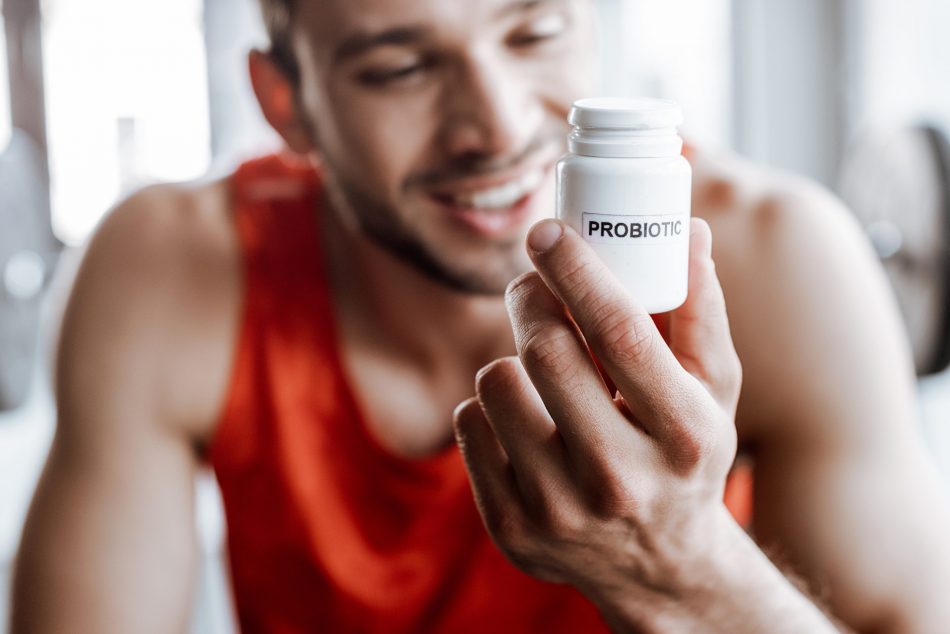Have you heard of probiotics? Chances are you have a basic understanding that they are good for your gut health—but do they have any specific benefits for men? Here’s what health experts want you to know about probiotics and gut health for guys.
Should men take probiotics?
Most experts are in agreement: men should definitely take probiotics, and so should almost everyone else. It’s hard to come up with an exact number of people suffering from sub-optimal gut balance or GI health, but it’s likely that a big percentage of the world’s population is affected. Gut health is deteriorated by processed foods, low-fiber diets, and increasing stress levels, all things that are common in the modern world.
According to integrative physician Bindiya Gandhi, M.D., taking a daily probiotic is totally safe for most people (even if you may experience some initial side effects), so you can feel free to try them practically risk-free to see what works for you. However, if you’re immunocompromised or have pre-existing medical conditions, it’s smart to check with your doctor first.
Probiotic benefits for men
Though most research demonstrates a correlation rather than direct cause and effect, there are promising studies that show the specific benefits that a high-quality probiotic supplement can have for various aspects of men’s health.
Support sexual health (and mood)
For normal erectile function and a balanced mood, it’s essential to maintain healthy levels of serotonin. There is a bit of a gap in the research that explores the direct link between ejaculation and probiotics, however, research suggests that probiotic supplementation may boost levels of serotonin in the brain.
Support healthy testosterone levels
Once men reach the age of 30, they experience a natural decline in testosterone, the hormone that plays a crucial role in fertility and sperm production. According to this study, men who use probiotic supplements may experience an increase in testosterone levels while also regulating other sex hormones, which might have the added benefit of enhancing sperm quality.
This is also connected to sexual health because low testosterone levels can have a direct effect on libido. Testosterone also regulates muscle mass, strength, and bone density and is implicated in the production of red blood cells.
Support prostate health
Again, the current research around probiotics and prostate health is still in its early stages, however, there have been some promising results that suggest probiotics may help support a healthy prostate gland.
On top of these men-specific benefits, there are plenty of general benefits of taking probiotics, including boosting your brain health, supporting digestion, strengthening your immune system, and promoting metabolic health.
The best probiotics for men
While there are many probiotics out there that are specifically marketed to men, you shouldn’t allow yourself to get boxed into specific brands simply because they claim to be “for men.”
As always when it comes to supplements, quality is key. According to board-certified Vincent M. Pedre, M.D., “that goes triple for probiotics.” What you get won’t always match the claims on the labels, so here are some guidelines that can help you select the right probiotics for you:
-
Choose a probiotic that contains billions—not millions—of organisms (or colony-forming units, CFUs) per dose
The acid in your stomach is so strong that some of the bacteria in probiotic supplements won’t make it through. To mitigate this loss, higher CFUs will help.
-
Look for bacterial diversity
Don’t go with a probiotic that only has one or two types of bacteria. Instead, try to find one that has multiple strains, including strains from well-studied genera such as Lactobacillus, Bifidobacterium, Streptococcus, and Saccharomyces.
-
Avoid unnecessary ingredients
If you see fillers such as lactose and cornstarch in the ingredient list, skip it. These kinds of ingredients can contribute to digestive upset in some people, which no one wants.
-
Check the manufacturing date
As long as you store them properly, high-quality probiotics are good for two years after the manufacturing date, so be sure you’re not purchasing anything at the tail end of those two years. Also, once you have them, make sure to store them according to the manufacturer’s recommendations.
-
Go dairy-free
A lot of probiotic supplements contain dairy, but Pedre suggests opting for one that doesn’t, which is especially important for those who are lactose intolerant.










